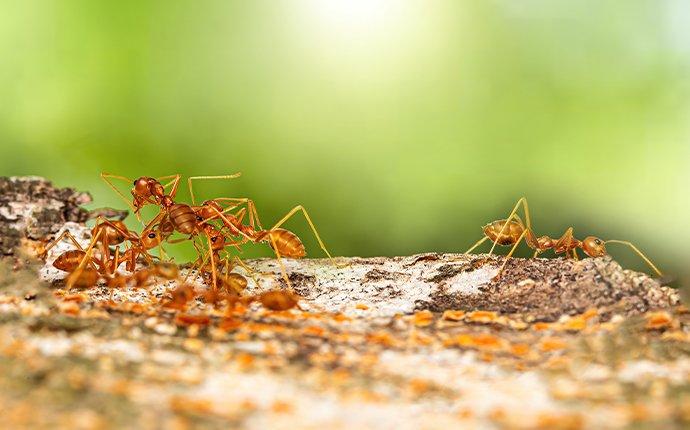Professional Ant Control Services: Customized Treatments for Long-term Outcomes
Professional Ant Control Services: Customized Treatments for Long-term Outcomes
Blog Article
Environmental Effect of Pest Control: Balancing Performance With Sustainability
The ecological effect of parasite control is a crucial issue that requires a delicate balance in between achieving efficiency in making sure and handling bugs sustainability of our communities. From the usage of unsafe chemicals that seep into our soil and water to the unintentional consequences on non-target varieties, the effects of conventional insect control techniques are significant.
Unsafe Chemicals in Parasite Control
The utilization of hazardous chemicals in bug control presents significant ecological and wellness risks that warrant cautious consideration and mitigation approaches. Herbicides, pesticides, and pesticides are frequently made use of to eradicate parasites, but their extensive application can cause unplanned effects. These chemicals can contaminate dirt, water sources, and the air, influencing not only the targeted parasites however also helpful insects, wild animals, and people.

To address these risks, integrated pest management (IPM) strategies are being promoted as a more lasting option. IPM entails a mix of methods such as organic control, habitat adjustment, and the targeted use of pesticides as a last hotel (ant control newtonnc). By embracing a holistic strategy to pest control, we can lessen the ecological and wellness effects linked with harmful chemicals while properly managing pest populaces
Impact on Non-Target Species
Taking into consideration the unplanned consequences of bug control approaches, the effect on non-target types is a critical facet that calls for detailed evaluation. While insect control procedures intend to target certain parasites, other organisms in the community might be unintentionally impacted. Non-target species, including beneficial pests, birds, mammals, and also plants, can suffer straight or indirect harm from chemical applications or organic control techniques.
Pesticides developed to deal with a specific bug parasite might damage pollinators like bees or all-natural killers such as ladybugs. Organic control agents, if not species-specific, can position risks to unplanned targets, interfering with the eco-friendly balance.
To mitigate the effect on non-target species, integrated insect administration (IPM) methods that emphasize an all natural approach to pest control are suggested. These approaches prioritize the usage of eco-friendly practices, lessening harm to valuable microorganisms while efficiently handling pest populaces. Performing comprehensive threat analyses and monitoring the results of insect control efforts are important steps in safeguarding non-target types and promoting total ecosystem health and wellness.
Dirt and Water Contamination
Unintentional ecological repercussions of insect control methods extend beyond impacting non-target varieties, with substantial ramifications for soil and water contamination - termite control. Chemicals, herbicides, and chemical fertilizers made use of in parasite control can seep into the soil and pollute groundwater, posing a risk to both aquatic and terrestrial environments.
Water contamination is an additional essential concern connected with insect control methods. Runoff from agricultural fields treated with pesticides can carry these chemicals right into nearby water bodies, impacting water microorganisms and water quality. Impurities in water sources can have significant consequences, influencing not only water life however also human health and wellness via the consumption of polluted water or water organisms. To minimize soil and water contamination from insect control activities, integrated insect monitoring approaches that prioritize sustainability and lessen chemical inputs are important.
Air Contamination From Pesticide Usage
Direct exposure to airborne pesticides throughout farming applications presents a significant concern for air contamination control steps. They can volatilize right into the air and form unpredictable organic substances (VOCs) and various other airborne toxins when pesticides are splashed onto crops - termite control. These chemicals can add to the formation of ground-level ozone, a significant element of smoke that can have damaging effects on human wellness, plant efficiency, and overall air high quality. Additionally, chemical drift, where chemicals are brought by the wind to unexpected areas, can bring about the contamination of nearby ecological communities and water bodies.

Strategies for Sustainable Bug Control
In the realm of agricultural methods, applying lasting parasite control strategies is critical for preserving eco-friendly equilibrium and safeguarding crop yields. Sustainable parasite control stresses making use of eco-friendly approaches to take care of parasite populaces properly while minimizing harm to non-target organisms and environments. Integrated Bug Administration (IPM) is a commonly embraced method that integrates biological, social, physical, and chemical control approaches to attain lasting insect administration services.
Crop turning and diversification are additionally effective strategies to interrupt pest life cycles and develop less favorable problems for pests to prosper. Ultimately, by incorporating these sustainable bug control techniques, farmers can attain a balance between pest monitoring efficiency and ecological stewardship.
Verdict
To conclude, the ecological impact of bug control methods need to be very carefully taken into consideration to balance performance with sustainability. Damaging chemicals made use of in pest control can result in soil and water contamination, air contamination, and damage non-target varieties - ant control. It is vital to apply sustainable insect control strategies to lessen these adverse effects on the environment and promote a much healthier environment for future generations
By taking on an alternative approach to pest control, we can minimize the environmental and health effects connected with unsafe chemicals while effectively taking care of pest populations.

To reduce the air pollution caused by chemical usage, it is crucial to take on incorporated pest administration strategies that focus on the usage of non-chemical pest control techniques, such as plant rotation, all-natural predators, and resistant plant varieties. Sustainable bug control emphasizes the use of eco friendly methods to take care my response of pest populaces properly while reducing injury to non-target microorganisms and communities. Integrated Bug Monitoring (IPM) is a widely adopted technique that incorporates organic, cultural, physical, and chemical control methods to attain long-lasting parasite administration options.
Report this page